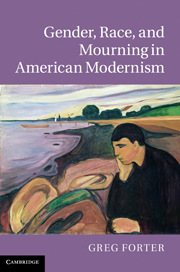Book contents
- Frontmatter
- Contents
- Acknowledgements
- Introduction
- 1 Gender, melancholy, and the whiteness of impersonal form in The Great Gatsby
- 2 Redeeming violence in The Sun Also Rises: phallic embodiment, primitive ritual, fetishistic melancholia
- 3 Versions of traumatic melancholia: the burden of white man's history in Light in August and Absalom, Absalom!
- 4 The Professor's House: primitivist melancholy and the gender of utopian forms
- Afterword
- Notes
- Index
Afterword
Published online by Cambridge University Press: 21 April 2011
- Frontmatter
- Contents
- Acknowledgements
- Introduction
- 1 Gender, melancholy, and the whiteness of impersonal form in The Great Gatsby
- 2 Redeeming violence in The Sun Also Rises: phallic embodiment, primitive ritual, fetishistic melancholia
- 3 Versions of traumatic melancholia: the burden of white man's history in Light in August and Absalom, Absalom!
- 4 The Professor's House: primitivist melancholy and the gender of utopian forms
- Afterword
- Notes
- Index
Summary
At various points in the course of this study, I have emphasized the afterlife of canonical modernism's melancholy aesthetic. The continued prestige of modernist literature, I've suggested, compels us to ask after the ongoing effects of that literature's treatment of gendered and racial “impurity” as both lost and impossible to mourn (or recover). Contemporary theories of mourning and trauma are particularly fertile ground for this investigation. They often replicate pivotal aspects of modernism's melancholia, recommending melancholy as a response to social loss while even at times repudiating mourning in implicitly gendered terms: as an insufficiently rigorous, “sentimental” endorsement of recovery, consolation, and restitution. My treatment of these tendencies has aimed to show how the critique of modernist manhood is not a narrowly academic affair. The critique anatomizes a structure of feeling that exceeds both the aesthetic practice of modernism and the temporal boundaries demarcating the “modern” period itself.
An important book by David Savran enables one to push these points further. Though neither modernism nor melancholia is an organizing category of his analysis, the latter term plays a surprising role in Savran's genealogy of white masculinity in the United States since the Second World War. His largest claim is that, beginning with the Beats' rebellion against Cold War heteronormativity in the 1950s, white masculinity has developed an increasing bifurcation, a split between a feminine commitment to masochistic suffering and a masculine, sadistic commitment to inflicting pain on others (and on the self).
- Type
- Chapter
- Information
- Gender, Race, and Mourning in American Modernism , pp. 178 - 193Publisher: Cambridge University PressPrint publication year: 2011



